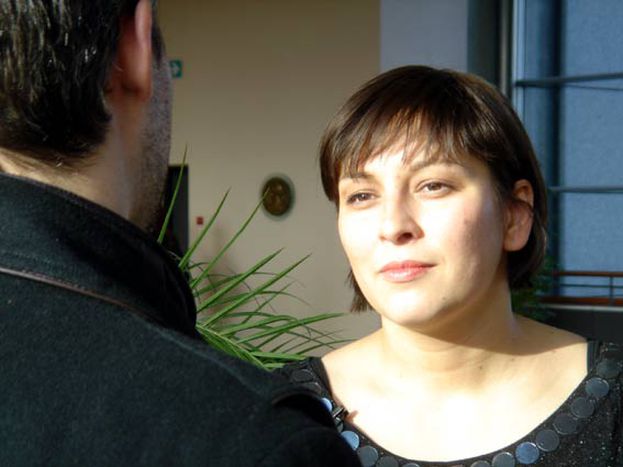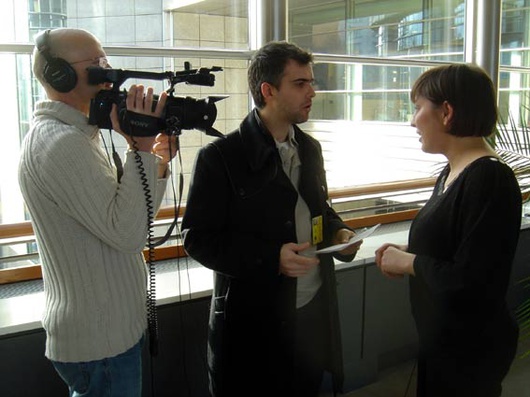
Lívia Járóka: female, Roma and Euro MP
Published on
Translation by:
 rhiannon_nicolson
rhiannon_nicolson
The first female Roma member of the European parliament takes stock of her first term in office and announces that she will run in this year’s European elections in June. We talk women, Roma statistics and the EU institutions
Lívia Járóka criticises the current Czech Republic presidency of the EU, which after a term of six months will pass on the presidency to another nation as is customary. She deplores the fact that they have yet to draw up an agenda to deal with issues relating to ethnic minorities and gender equality. However, she considers that this four year session has been positive in what has been achieved by the European parliament. 'The issue of women’s rights has been brought into the political arena thanks to the parliament, a matter which neither the European council nor the European commission has been concerned with handling,' asserts the young Hungarian member of the European people’s party. In her opinion, the European parliament 'has ceased to be a tool at the commission’s disposal, and has instead become a rival challenging the commission.'
The EU parliament has become a rival challenging the commission
The most important thing in her mind is that the situation of the Roma people is on the parliament’s agenda, in contrast to previous years: 'All you have to do is look at the fact that it seems the majority of citizens will belong to some sort of minority group in the future!' she points out, highlighting the need to protect these groups. Járóka has been chosen to be the face of the European parliament and wants to be the example that proves that anti-discrimination is not enough to defend the Roma people: 'We have to move on from a parental viewpoint to another, more professional stance.' Interview.
Which directive do you feel has been the least beneficial in this past term?
They have all been beneficial, but regretfully I feel that we at the European parliament are almost always too late to help. We poorly supervise the application of each directive in all countries. For example, the Reach directive, designed to defend consumers from toxic substances, took a long time to be approved, and even more for it to be enacted. We lack efficiency.
Which do you think has been the greatest battle your party, the European people’s party (EPP), has been embroiled in?
To start with, adding me to their ranks! Following this, the fight for the rights of all Roma people and their children, something which had previously been present only in liberal and socialist spheres. Since its growth in 2004, the EPP has taken many stances which are symbolic of their dynamic for change.
Do you consider European politics to be sexist?
 Being a woman in the political arena is difficult, but it’s even more difficult to bring issues relating to women to the foreground. It’s difficult to convince the establishment that women should have a presence in institutions. On that side of matters, yes, I do think that European politics is somewhat sexist. And also because whenever people are needed to represent issues which are not very popular, such as global poverty, or when a new face is needed to represent parliament, women are always chosen, whilst for matters of economic prosperity it is always men who are held up in front of voters.
Being a woman in the political arena is difficult, but it’s even more difficult to bring issues relating to women to the foreground. It’s difficult to convince the establishment that women should have a presence in institutions. On that side of matters, yes, I do think that European politics is somewhat sexist. And also because whenever people are needed to represent issues which are not very popular, such as global poverty, or when a new face is needed to represent parliament, women are always chosen, whilst for matters of economic prosperity it is always men who are held up in front of voters.
31% of MEPs are female. Is this still very few in your opinion?
If we compare this parliament with other national parliaments we aren’t doing too badly, but it still isn’t enough. The number of women in the cabinet doesn’t correspond to their importance in society and it seems that the number of women also reflects the inequality that still exists. We will have to wait and see if our numbers of women increase in the elections in June. In my party (Fidesz, Hungarian conservatives), for example, the number of women on the ballot slips will be the same as that of 2004.
Does that mean that there won’t be an increase?
I don’t think so. And the same will happen in all the other countries and parties.
So your party won’t be featuring gender equality during its electoral campaign?
Not at all. And the worst thing is that voters do not seem to be interested in these issues because we still live in societies which are overly patriarchal.
Does the situation of Roma people in Hungary and Italy cause you concern?
The situation of Roma people in eastern Europe has not ceased to decline since the fall of communism. In western Europe the situation in Italy is only the tip of the iceberg. What particularly concerns me is the anti-Roma sentiment which is growing during this time of economic crisis. In addition to this, I don’t see any political parties which are prepared to fight against stereotypes or who are interested in winning the votes of Roma people. It’s true that there have been many promises made, but I don’t see money being channeled anywhere. Brussels is delighted by the wonderful integration programs presented to them by each member state, but it doesn’t concern itself to verify that they are being carried out.
What is the obstacle which prevents communication between Roma and non-Roma people?
Prejudices and a lack of common spaces…
In what sense do you mean ‘common spaces’?
There are no common places of work. During the communist regime each Roma citizen went to work every morning alongside non-Romas. At this time you had a lot of mixed marriages also (I myself am the product of a mixed marriage), in contrast today there are almost none because Roma people are unemployed. 90% of Romas in Hungary are long-term unemployed or work on the black market.
90% of Romas in Hungary are long-term unemployed or work on the black market
On the other hand, the media doesn’t act responsibly when they fuel people’s prejudices against Romas and when they exaggerate their faults. Even 'experts' on Roma don’t know what they are talking about, because shamefully there are no official statistics about Roma people.
What would you deem the priority in order to improve communication?
The creation of joint workplaces and schools for non-Roma and Roma people.
First published on 15 April 2009 on eudebate2009.eu
Translated from Lívia Járóka: mujer, gitana y europarlamentaria


